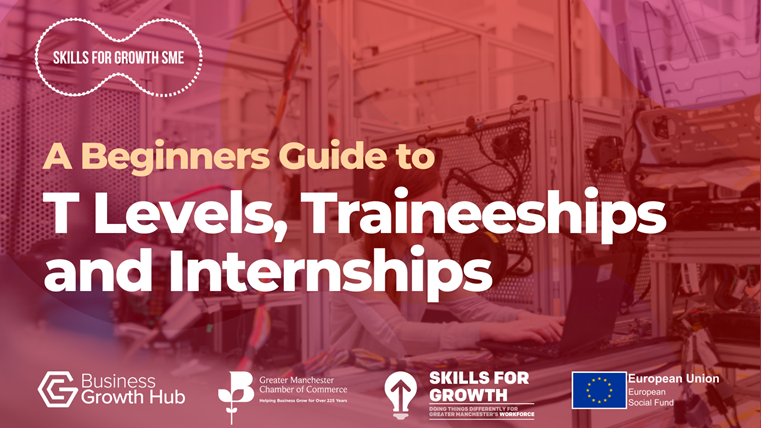Skills for Growth - SME Support is a fully funded, tailored service to help upskill your employees and improve business productivity.

A Beginners Guide to T Levels, Traineeships, and Internships
This article is your beginner’s guide to understanding T Levels, Traineeships, and Internships. We’ve broken down these workplace learning pathways, so you can better understand the benefits for your business.
T Levels
T Levels were first introduced in September 2020, with three courses initially being offered. They are designed for high school leavers and are equivalent to three A-Levels. T Levels have been developed in collaboration with employers and education providers to ensure the content of the courses match the needs of industry and prepare students for the next step of their career, whether that is going into work, further training, or further study.
Like apprenticeships, T Levels are broken up into a mixture of on-the-job experience and classroom learning. T Levels, however, entitle the student to 80% of their time spent on classroom learning, and 20% in an industry placement over the course of two years.
Why should you offer T Level Placements?
- Develop a young talent pool – Offering T Level placements would give you access to a pool of young talent to bring into your business who will bring their own set of skills and ideas that can improve your business.
- Train them to fit your system – Being able to train a young person up from scratch allows you to develop them to best suit your workplace and how your business operates.
- Option to hire them permanently – Upon completion of their T Level qualification, you might find that they were a valuable asset to your business and choose to hire them on a full-time contract, offer them further training via an apprenticeship, traineeship or short courses.
- Build relationships with training provider – You will have the opportunity to work alongside a training provider in supporting your T Level Student during their placement, which you could use to source further training for the student or even other employees in your workforce to upskill them in certain areas.

Traineeships
A traineeship is designed prepare an individual for work, or to become an apprentice upon completion of their traineeship, and complete further learning. Traineeships last between 6 weeks and 1 year and are designed for young people between the ages of 16-24 qualified up to and including level 3 (equivalent to an A Level). Trainees complete a work placement of at least 70 hours or more, receiving help with the skills they need to move into a job placement or apprenticeship, get feedback from the employer and help with English, maths, and basic digital skills (if required).
Traineeships are technically unpaid opportunities, but in order to attract quality candidates and offer better training conditions, you may want to consider allowing expenses for things like travel, uniforms and meal prices.
Why should you offer Traineeships?
Hiring a trainee provides your business with a low cost or even no cost way of filling skills gaps and accessing local untapped talent to shape your workforce and bring new ideas into your business.
Benefits include:
- Low-cost recruitment – Traineeships provide an excellent way of sampling potential candidates for current or future vacancies, and progression into an apprenticeship, all at no cost to your business.
- Develop a loyal and talented workforce – Traineeships allow you to shape the skills and experience of young people from your local area, helping your business to develop a loyal and talented workforce.
- Create a learning culture – Bringing in a trainee can help you to develop a culture of learning within your current workforce, boosting your employees’ knowledge and skills in mentoring, training, and management.


Internships
Internships are usually very short-term work experience opportunities designed and developed by the employer. It is up to you to decide how to shape the internship to suit the business, although there is official guidance for Supported Internships available if you’re looking to create opportunities for people with disabilities specifically. Some internships may involve the candidate working towards gaining a certification that will help them develop within their career, although this is not a requirement.
Why should you offer Internships?
- Develop mentors – Most interns are fresh out of school or study and may not have any significant work experience under their belt. This is a great opportunity for your existing staff to test their mentoring and coaching abilities by taking a young person under their wing.
- Tech savvy and curious – Young people today were raised on technology. As a mentee they might provide some insight into what works about the way you use tech to communicate and complete tasks in the workplace that to them feel clunky or in need of rethinking.
- Bright young minds – You might look at an internship as a kind of trial period; a time to assess the intern’s skills and potential. Taking on a bright young mind who shows an interest in your workplace puts you in the perfect position to offer them employment after their internship is completed.

Skills for Growth – SME Support can aid you in sourcing training for your existing talent or develop recruitment pathways through learning placements for young people.
Visit the GM Skills Map course directory to start exploring some of the training opportunities available across the Greater Manchester region, or click here to apply for our fully funded support programme.
